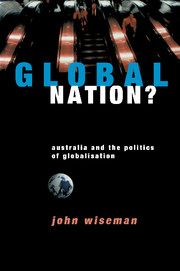Book contents
- Frontmatter
- Contents
- Abbreviations
- Acknowledgments
- 1 Introduction: Australia and the Politics of Globalisation
- 2 Breaking the Spell? Understanding Globalisation
- 3 Transforming the Global Economy? Trade, Capital and Power in the Late Twentieth Century
- 4 Onto the Global Racetrack? Globalising the Australian Economy
- 5 The Price of Competitiveness? The Social Impact of Globalisation on Australia
- 6 Wired to the World? Australia and the Globalisation of Media and Information Technologies
- 7 Nowhere to Hide? Australia in the Global Environment
- 8 Where in the World? Transforming Australian Political Relationships and National Identities
- 9 Alternative Strategies? Thinking and Acting Globally and Regionally
- 10 Alternative Directions? Thinking and Acting Locally and Nationally
- 11 Conclusion
- Notes
- Bibliography
- Index
11 - Conclusion
Published online by Cambridge University Press: 20 May 2010
- Frontmatter
- Contents
- Abbreviations
- Acknowledgments
- 1 Introduction: Australia and the Politics of Globalisation
- 2 Breaking the Spell? Understanding Globalisation
- 3 Transforming the Global Economy? Trade, Capital and Power in the Late Twentieth Century
- 4 Onto the Global Racetrack? Globalising the Australian Economy
- 5 The Price of Competitiveness? The Social Impact of Globalisation on Australia
- 6 Wired to the World? Australia and the Globalisation of Media and Information Technologies
- 7 Nowhere to Hide? Australia in the Global Environment
- 8 Where in the World? Transforming Australian Political Relationships and National Identities
- 9 Alternative Strategies? Thinking and Acting Globally and Regionally
- 10 Alternative Directions? Thinking and Acting Locally and Nationally
- 11 Conclusion
- Notes
- Bibliography
- Index
Summary
In our stories of creativity, survival, and day to day heroism, alongside stories of invasion, migration, colonisation and conflict, we may find that it is what we share with other societies, in Europe, in Asia, in America and Africa, that matters to us most.
Ann CurthoysIn the last fifteen years the deregulation and restructuring of the Australian economy has led to a dramatic shift in Australian political, social and cultural assumptions. The 1980s and 1990s have seen the old ‘certainties’ of protectionism, arbitration and the belief in a significant role for the public sector swept away in a wave of enthusiasm for the brave new world of global competitiveness. For some the acceptance of ‘the power of markets and the internationalisation of Australia’ is a transformation to be celebrated. For many others the experience has been one of deepening inequality, insecurity and trauma as jobs, services and communities have disappeared.
Global Nation? has sought to question the view that there is only one way to approach the dilemmas of globalisation. In applying this argument to Australia, the starting point is to begin with a grounded critique of the real costs and dangers of taken-for-granted forms of the unregulated free-market globalisation of the Australian economy. A sustained critique of the dominance of neo-liberal, economic rationalist economics needs to be linked to the articulation of a language that can successfully convey the imagination of more desirable relationships between individuality and mutuality; solidarity and difference; ecology and economy.
- Type
- Chapter
- Information
- Global Nation?Australia and the Politics of Globalisation, pp. 149 - 151Publisher: Cambridge University PressPrint publication year: 1998

